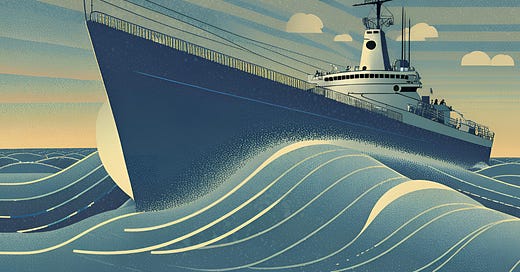
Welcome to the 29th Cable, our weekly roundup of British foreign and defence policy.
Tariffs are the talk of the town once again, with the new administration in the United States (US) imposing 25% tariffs on all steel and aluminum imports, while the People’s Republic of China (PRC) has hit back by placing export restrictions on several critical minerals, including tungsten, indium and tellurium.
It has also been another busy week for His Majesty’s (HM) Government, with Sir Keir Starmer, Prime Minister, in Brussels for talks with leaders of both the European Union (EU) and the North Atlantic Treaty Organisation (NATO). Meanwhile, David Lammy, Foreign Secretary, visited Ukraine to enhance bilateral ties between the two nations.
Welcome back to the Cable!
Britain’s push to bolster its international presence
The recent actions and rhetoric of the new American administration provide evidence that the US may pull back from its long-established position as the security guarantor of Europe. In his first weeks in power, Donald Trump, President of the US, has upended the workings of the federal government, with the likely result that America will be embroiled in domestic infighting for the coming months and maybe years, refocusing state capacity and distracting policy makers from taking action on the global stage. Likewise, the major powers of continental Europe, namely France and Germany, are facing rising political instability, with new elections unlikely to correct the course.
In this environment and following the result of last year’s general election, the United Kingdom (UK) finds itself in a somewhat advantageous position. A stable government with a large majority, coupled with significant resources to act on the world stage.
The question is, where should Britain focus its efforts to secure the greatest impact? Top of the list, HM Government seems set to drive support for Ukraine. The recent ‘100 Year Partnership’ signed between London and Kyiv and the decision for Britain to chair the upcoming meeting of the Ukraine Defence Contact Group (see below) are indicative of HM Government’s continued resolve on this issue. Likewise, Britain is pursuing deepened defence cooperation across Europe. So far, this has focused on bilateral ties, such as with Poland and Germany, but the UK-EU summit, due to take place later this year, will focus on enhancing security ties between London and Brussels. However, Britain still has to show leadership through action, most importantly by increasing investment in defence to at least 2.5% of Gross Domestic Product (GDP).
In the Indo-Pacific, Britain is well placed to bolster its presence. The Royal Navy will deploy a Carrier Strike Group for a tour of the region later this year, a clear sign of HM Government’s continued engagement with Indo-Pacific allies and partners. The UK is also using its membership in, or connections to, multilateral and minilaterial groupings – including AUKUS, the Association of South East Asian Nations (ASEAN), the Five Power Defence Arrangements (FPDA), and the Comprehensive and Progressive Agreement for Trans-Pacific Partnership (CPTPP) – to full advantage. But a lack of clarity in its ‘China policy’ will hamper HM Government’s strategic position in the region.
Finally, Britain is pushing for stronger action to develop clean energy. Both to weaken Chinese dominance in the green energy sector but also to enhance resilience to energy shocks, such as the one that followed the full-scale invasion of Ukraine by Russia.
None of this will be easy, and will require long-term strategic thinking and a whole-of-government approach – something that has been somewhat lacking over the last seven months – but the opportunity is there and HM Government should try to seize it.
Key diplomacy
The Prime Minister was in Brussels last week for key meetings with EU and NATO partners:
On 3rd February, Sir Keir met with the leaders of the 27 EU countries as part of his proposed ‘reset’ with the bloc. In the meeting, he called for Europeans to ‘shoulder more of the burden’ for continental security and to continue to support Ukraine in its battle for survival against Russian aggression.
Sir Keir also visited Mark Rutte, Secretary General of NATO, in which he restated Britain’s ‘unwavering commitment to NATO as the cornerstone of our security.’ Both men agreed NATO allies need to keep up the pressure on Russia.
Lammy visited Ukraine last week to bolster long-term partnerships between London and Kyiv. During the visit, he announced an extra £55 million to enhance the resilience of Ukraine’s energy, agricultural and services sectors. This will include more than £3 million to help Kyiv deliver agricultural products to Syria.
The Foreign Commonwealth and Development Office (FCDO) summoned the Russian ambassador to the UK last week to revoke the accreditation of a Russian diplomat. The FCDO made the decision in response to Russia’s ‘unprovoked and baseless decision to strip the accreditation of a British diplomat in Moscow’ in November 2024.
The FCDO has announced an uplift of £22.45 million in humanitarian aid to Myanmar as the country’s civil war enters its fifth year. Myanmar is facing a serious humanitarian crisis, with almost 20 million people now requiring aid. This uplift will bring UK bilateral overseas assistance to Myanmar for 2024-2025 to £66.42 million, which will focus on healthcare and agricultural support.
Defence
Britain will chair the 26th meeting of the Ukraine Defence Contact Group – a defence group focused on providing military support for Kyiv, made up of over 50 nations – for the first time this week following a request from the White House. The Biden Administration has led the previous 25 meetings, and reporting is unclear if the US will chair such meetings in the future. However, according to The Times, the new US administration has asked HM Government to take on a critical leadership position within NATO in Europe.
The Ministry of Defence (MOD) has announced a number of reforms to the armed forces recruitment process, including:
The creation of the Armed Forces Recruitment Service (AFRS) to ‘provide a streamlined, single-entry point for prospective recruits’ and to speed up the recruitment process. The MOD expects the AFRS to enter service in 2027.
The development of a ‘cyber pipeline’ to fast track digitally savvy recruits into the Armed Forces. The increasing number of cyber attacks on the UK has informed the decision to create this pipeline – with more than 90,000 ‘sub-threshold’ attacks occurring in the last two years.
On 4th February, HM Government announced the appointment of Angus Lapsley as the new UK Permanent Representative to NATO. Lapsley has spent over 30 years in the Civil Service, most recently chosen to assist with the Strategic Defence Review. Presently, he is NATO’s Assistant Secretary General for Defence Policy and Planning. Lapsley will take up his appointment in April.
Environment and climate
HM Government has announced a significant policy shift for the nuclear energy sector. Sir Keir has stated his government’s intention for the UK to return to being ‘one of the world leaders on nuclear [energy]’ by reforming planning rules to make it easier to build nuclear power and supporting the development of small modular reactors (SMRs). Britain was the first country to develop commercial nuclear power in the 1950s, with nuclear power generating approximately a quarter of Britain’s electricity in the 1990s. However, the UK is now one of the most expensive places in the world to build nuclear reactors, with the energy source only contributing 15% of the country’s electricity.
HM Government has relaunched the Net Zero Council – a body which will bring together key stakeholders from business, civil society and government to drive the clean energy transition – with the aim of deepening public-private partnerships and expanding economic opportunities within the sector. The first meeting held last week, focused on outlining the Council’s priorities for the next year, which included: increasing expert input to inform net zero strategies, enhancing public engagement and developing a sector roadmap to help businesses adopt transition plans.
How Britain is seen overseas
The Carnegie Endowment for International Peace released an article on the future of the UK-EU relationship. Given the current geopolitical environment, the article claims that London and Brussels need to ‘forge a deeper foreign policy partnership’. However, this will require overcoming significant political hurdles and resolving the lack of trust between them that has developed since Britain left the EU. The article calls for compromise and for both parties to take steps ‘toward more regular, formalised cooperation.’
How competitors frame Britain
TASS reported on a statement made by Sergey Aksyonov, so-called ‘Head of the Republic of Crimea’, in which he claimed that Britain desires the breakup of the Russian Federation. The comment was made during an event commemorating the 80th anniversary of the Yalta Conference, at which Aksyonov said ‘Never will the Anglo-Saxons give up the idea of breaking apart our country…regardless of who comes to power’. Russian paranoia over British intentions remains as lively as ever.
Sputnik International published propaganda in which it claimed that the ‘West’ has created a false flag event in the Baltic Sea to transform it into a ‘NATO lake.’ Describing the recent spate of attacks to critical subsea infrastructure as the ‘Gulf of Tonkin: Baltic edition’, the article claims NATO will blame Russia to ‘justify the inspection of ships coming out of St. Petersburg’. Russian state media can cry all it likes, but only the Kremlin is responsible for degrading security in the Baltic Sea region.
Assessing national power
At the end of January, Rachel Reeves, Chancellor of the Exchequer, delivered a major speech on economic growth in which she made a series of important announcements. Among these were plans to improve connectivity between Oxford and Cambridge with a view to creating ‘Europe’s Silicon Valley’.
For decades, politicians from around the world have tried to capture the essence of Silicon Valley’s success. In 1960, Charles de Gaulle, then President of France, toured Silicon Valley to try understanding the key to its prosperity and productivity, as did Dmitri Medvedev, former President of Russia, half a century later.
But Silicon Valley has defied efforts to replicate it. The region remains the world’s pre-eminent hub for high-tech innovation and the go-to ecosystem for start-up companies. Over the last century, Silicon Valley has been at the forefront of successive waves of innovation, showcasing its resilience and dominance time and again in a way no other innovation cluster has been able to.
There are lessons the Chancellor can learn from Silicon Valley and apply in the development of the Oxford-Cambridge corridor. These include – but are not limited to – government support and investment in science and technology research and development (R&D); world-class universities that specialise in science and technology; and a supportive ecosystem of industries and networks that facilitate entrepreneurialism.
Universities such as Stanford have played a central role in the development of Silicon Valley and its strategic advantage. Stanford’s physical proximity helped to provide Silicon Valley access to research activities, world-class engineers, opportunities to continue education, as well as opportunities for Stanford faculty members to provide their expertise formally or informally.
At the same time, Silicon Valley was a source of funding, internships, networks and employment for Stanford students and graduates. In the 1980s and 1990s, Stanford professors and graduates founded hundreds of firms, including Silicon Graphics, Sun Microsystems, Yahoo!, and Google.
The Oxford-Cambridge area also has enormous potential, being home to two of the world’s greatest universities. In terms of science and technology intensity, Cambridge is ranked as the world’s pre-eminent science and technology cluster, while Oxford is ranked fourth. But poor connectivity between these hubs is stifling the potential of the region.
In Silicon Valley, a combination of the academia-industry environment and talent allowed entrepreneurial culture to emerge organically. Transport connectivity is central to this. A critical mass of exciting opportunities also creates a living and working environment that attracts the best and brightest talent. As Science put it: ‘Brains go where brains are’.
If you found this Cable useful, please subscribe or pledge your support!
What do you think about this Cable? Why not leave a comment below?













